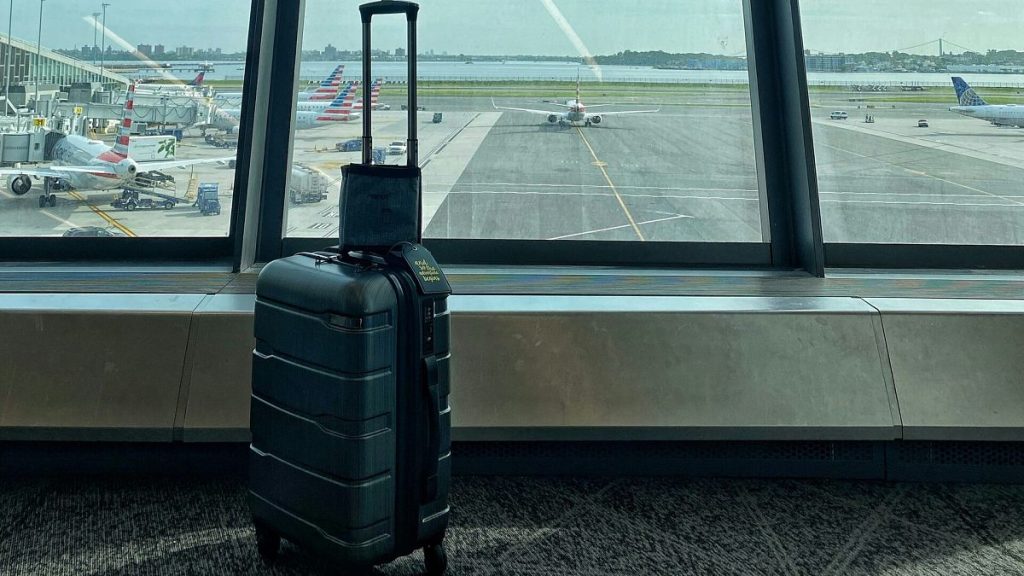Ryanair Tightens Baggage Rules as Budget Airlines Reconsider Their Models
Ryanair is intensifying its crackdown on oversized carry-on luggage, raising the stakes in the ongoing battle between budget airlines and passengers trying to maximize what they can bring aboard. Starting November, the Irish carrier will increase staff bonuses from €1.50 to €2.50 for each non-compliant bag caught at boarding gates, while removing the previous €80 monthly cap on such incentives. This change effectively creates an unlimited earning potential for gate agents who enforce the airline’s strict baggage policy. For passengers caught with oversized luggage, the consequences remain severe – facing charges up to €75 to check their bag into the cargo hold. During a recent London press conference, Ryanair CEO Michael O’Leary bluntly defended the policy: “We want everybody to comply with the rules. If you comply with the rules, no issues.” Despite only catching about 200,000 passengers annually with oversized bags (a mere 0.1 percent of Ryanair’s 200 million passengers), O’Leary insists stricter enforcement is crucial for maintaining punctuality and keeping base fares low.
The current Ryanair policy allows only one small personal item (measuring no more than 40 x 30 x 20 centimeters) that fits under the seat in front as part of the basic fare. Anything beyond this – including small wheelie cases – requires an additional fee. O’Leary expressed bewilderment at passengers who still attempt to circumvent these rules: “I am still mystified by the number of people with rucksacks who think they’re going to get through the gate and we won’t notice. We will, and you will be paying for the rucksack. You’re not getting on if it doesn’t fit.” This hardline approach isn’t unique to Ryanair – competitor easyJet has implemented similar staff incentives, with reports that baggage handlers from Swissport earn approximately £1.20 (about €1.40) for each oversized bag they identify at boarding gates. The practice represents a growing trend among budget carriers to strictly enforce policies that generate additional revenue while maintaining the appearance of rock-bottom base fares.
This baggage policy enforcement comes amid broader turbulence in the low-cost airline sector, as carriers worldwide reassess their business models in a post-pandemic travel landscape. The ultra-cheap advertised fares that built the budget airline industry have long been subsidized by a complex web of additional charges – from baggage fees to seat selection, priority boarding, and even charges for printing boarding passes. These ancillary revenues have become increasingly essential to the financial health of these airlines, especially as they face rising fuel costs, inflation, and growing pressure to address their environmental impact. The acceleration of policy changes across the industry suggests budget carriers are searching for new ways to maintain profitability while still offering the low headline prices that attract customers in a competitive market.
The shift is particularly evident in the United States, where Southwest Airlines – long known for its unique approach to budget travel – has recently abandoned its iconic open seating system after decades of marketing it as a cornerstone of its identity. In another controversial move, Southwest announced that plus-size travelers will soon be required to purchase an additional seat, a policy that has drawn criticism from advocacy groups but reflects the industry’s relentless drive to monetize every available inch of cabin space. These changes signal that even the most established players in the budget airline sector are reconsidering longstanding practices as they adapt to new market realities and passenger expectations. The willingness to alter fundamental aspects of their service models suggests an industry at a crossroads, balancing the competing demands of affordability, profitability, and customer experience.
In Europe, however, the regulatory landscape may force budget airlines to reconsider their approach to baggage fees. The European Union advanced legislation in June that would guarantee passengers the right to bring hand luggage on board at no additional charge. If this measure passes, it could significantly impact the revenue streams of carriers like Ryanair and easyJet, which have built substantial portions of their business models around charging for such services. Industry analysts note that such regulatory changes could have unintended consequences – potentially leading airlines to simply raise base fares or develop new fees in other areas to compensate for lost revenue. This highlights the complex dance between regulation and market forces in the airline industry, where attempts to protect consumer rights often trigger adaptive responses from carriers determined to maintain their profit margins.
Despite these potential regulatory headwinds, Ryanair shows no indication of softening its approach to baggage enforcement or other ancillary revenue streams. O’Leary remains characteristically unapologetic about the airline’s strict policies: “I want our ground handling people to be catching people who are scamming the system, and I make absolutely no apology for it whatsoever.” This stance reflects the fundamental tension at the heart of the budget airline model – the promise of extraordinarily low fares comes with increasingly strict conditions and potential penalties for non-compliance. As travelers and airlines continue this complicated relationship, passengers face a clear choice: either meticulously adhere to increasingly stringent rules or be prepared to pay significant premiums for flexibility. Meanwhile, budget carriers like Ryanair are betting that enough customers will continue to accept these trade-offs in exchange for the possibility of remarkably cheap travel, even as the true cost of such bargains becomes increasingly complex to calculate.









